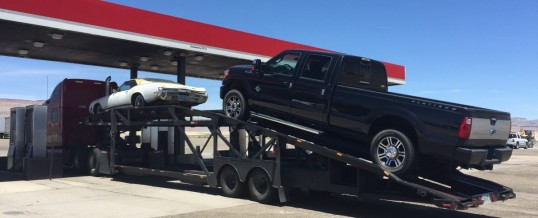When you drive a Truck! Carry a Smartphone?

Providing closed truck transportation services requires detail and understanding of the different facets of the products. Because of this, communication is critical. Carriers need to have excellent communication with their transportation provider so that cargo details can be clearly conveyed up and down the supply chain. Supply chain efficiency can only be achieved when there is clear and continuous communication between all stakeholders. This will create a mutual understanding of loading situations and help educate each participating party on industry practices. Below we will show when communication is most important and the available communication methods. Carrying a smartphone is of utmost importance these days.
When is communication most important? Carry a Smartphone
Pickup - Pickup details are critical. You need to communicate a lot more information to your transportation service provider during loading, to make sure that the details of the load are as listed on the paperwork and in your system. The essential information that closed transport drivers must communicate is the type of product, the quantity, the description, and the type of packaging; temperature; specifications of the temperature recording device (including problems).
Delays - Truck drivers of closed transportation services need to immediately contact their transportation provider if they experience any type of delay. Delays include, but are not limited to, delays at pickup or drop-off locations (from waiting for a door, to packing, to inspections); Weather delays (especially in mountain passes in winter), traffic, and construction delays.
HOS Updates – Truck drivers are running out of hours, and many times this fact is discovered by the DOT on weighing scales. This can cause a driver to be ordered off duty. HOS updates need to be communicated to the transportation provider immediately, who can run the miles and assess whether delivery is still possible. That's why our CSR department always asks our drivers if they are “on time” - providing this information ensures that everyone is up to date with the most accurate information.
Delivery - As with pickups, the details a truck driver provides at delivery are critical. Any problems (inclined pallets, damaged boxes, temperature variations, product quality, and decomposition) at the time of delivery should be reported immediately and documented with photos (so we highly recommend that each operator has a smartphone with camera functionality).
Claims - If a request occurs, it can sometimes take weeks and even months to resolve fully. During this time, being available to your transportation provider will ensure that any questions from third parties (salvage companies, USDA inspectors, or insurance adjusters) can be answered quickly. It will also give drivers of closed transportation services peace of mind knowing that they can contact their transportation provider at any time with questions or their claim status.
Communication methods
The truck companies have several methods of communication available to you. Use one or a combination of many to access the contact and information you need from the drivers:
Telephone - the best and most efficient way to convey immediate details and ensure that all points have been covered. We often suggest that drivers call us first and then use one of the communication formats to document the conversation or send any supporting information that is required. The use of the telephone ensures that communication on time-sensitive matters is as fast as possible.
Skype - Another mobile service that has excellent reliability for communication with the truck drivers. This also required mobile phone or wifi data and can be downloaded to a variety of platforms. Each employee has an individual Skype address. Call us today to get connected!
Email - A common way for closed freight service companies to submit critical cargo information, including paperwork in transit, photos and subsequent invoices, and documentation required for payment. Such truck transportation companies have as many group emails (for Sales, CSR, and Carrier Relations) and individual email addresses.
Text Messaging - Text is another excellent way to send your transportation provider quick information. You can send a text message to the CSR department.
Communicating promptly at all stages of a load will significantly increase the positive relationship between you and your transportation provider. In today's trucking technology landscape, mobile devices offer convenience and efficiency that can enhance many business operations. They are of great advantage and should be used to improve communication in closed transport services. Additionally, communication also reduces the potential for additional claims and or charges. Therefore, make sure that you are communicating important information when you need it, and using the most appropriate method.
Popular Posts
-

December 12, 2022
How Does RCC Auto Transport Works? -

December 15, 2022
What Happens When you need to… -

December 14, 2022
How To Ship A GMC Sierra -

December 13, 2022
How to Ship Small Equipment
